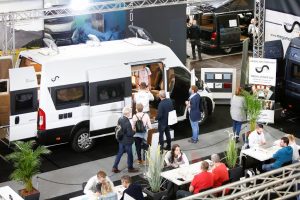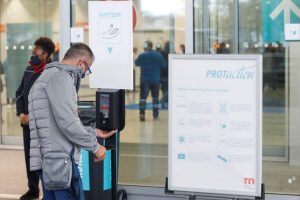For obvious reasons, a very limited number of media attended the Caravan Salon 2020 in Düsseldorf, but CWG member, John Rawlings, was one of them. He gives us a taste of what it was like complying with the COVID19 hygiene measures in place, and how it compared to previous years.

I’m glad I went to the Düsseldorf show, especially as nearly every other show since has been cancelled or postponed, but there were lots of things that were different about it this year.
To start with, several manufacturers, like the Erwin Hymer Group and other big brands, plus many suppliers, had decided they couldn’t or wouldn’t exhibit due to concerns for the health of their staff and visitors during the coronavirus pandemic. As a result, the Caravan Salon Düsseldorf 2020 was obviously not as huge as usual, with some empty stands obvious. Thankfully, there was still a good atmosphere and plenty of new models to see, but fewer concepts than usual.

A strict ‘Prot-action’ hygiene and sanitation protocol had to be complied with, which meant everyone at the show, visitors and exhibitors alike, had to wear a face covering at all times while inside the halls. This was monitored, and enforced, by staff at the entrances and patrolling the exhibition. Cleverly, some exhibitors had branded facemasks for their staff.
 The only time you didn’t have to wear a mask was while eating or drinking at one of the food outlets, when in the outside spaces, or if you were sitting in a manufacturer’s hospitality area, where most had placed plastic screens at each table between staff and visitors.
The only time you didn’t have to wear a mask was while eating or drinking at one of the food outlets, when in the outside spaces, or if you were sitting in a manufacturer’s hospitality area, where most had placed plastic screens at each table between staff and visitors.
It was reassuring to see hand sanitizer dispensers at entrances to every hall and at several places on each stand (but not at each caravan/motorhome). There seemed to be free access to view the campervans, caravans and motorhomes, just like normal. Some had signs asking people to adhere to social distancing, but I didn’t see this being enforced. To improve ventilation, windows on all vehicles and the doors to the halls had to be left open.

To reduce congestion, the aisles between stands were wider, and to avoid crowds at the entrances to the show, tickets could only be bought online (also good for ‘track and trace’ purposes, if required). To reduce visitor numbers, daily ticket sales were restricted to about half the numbers sold last year. The show still felt busy while I was there over the first weekend, and the social distancing was poor on some of the busier areas; thankfully, everyone was wearing face masks.
Despite these new restrictions, and the reduced number of exhibitors, 107,000 people visited the show, which was deemed a success given the circumstances. That’s much less than the two previous years (268,000 in 2019 and 250,211 in 2018), but many brands still claim to have achieved record sales in 2020; clearly, those who came to the show were serious, and those more worried about the coronavirus, restricted by travel bans, or with a more casual interest in caravans, campers and motorhomes stayed away.
The Caravan Salon Düsseldorf proved that it was possible to host an exhibition during a global pandemic, but let’s all hope that by next year’s show, things aren’t so different.
Words and images provided by John Rawlings
